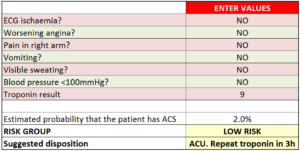The Pre-hospital Evaluation of Sensitive Troponin (PRESTO) study
If you are a Paramedic and convey patients to Musgrove Park, Southmead, Royal Devon & Exeter or Derriford Emergency Departments you can participate in the PRESTO study.
Chest pain is the most common reason for emergency hospital admission with 1.3 million patients presenting with chest pain in England and Wales annually.
- Clinicians will suspect a diagnosis of acute coronary syndromes (ACS) in approximately 50% of the patients presenting to EDs with chest pain
- 74% – 88% of patients are admitted for further tests (6-9 hours to detect any changes in troponin level)
- Less than 20% of those admitted to hospital on suspicion of ACS actually have that diagnosis
Most of these admissions could be avoided with improved diagnostic technology. Troponin-only Manchester Acute Coronary Syndromes (T-MACS) decision aid has been shown to effectively reduce unnecessary hospital admissions when used in the ED. T-MACS takes account of a patient’s history, examination and electrocardiogram (ECG) findings and biomarker results measured at the time of arrival in the ED and calculates the probability that a patient has ACS:
Risk Groups
T-MACS stratifies patients into one of four risk groups:
- Very low risk (<2% probability of ACS; ‘rule out’)
- Low risk (2-5% probability; suitable for rapid investigation in an ambulatory care environment)
- Moderate risk (5-95% probability; requires further investigation)
- High risk (>95% probability; ‘rule in’)
T-MACS identifies 45% of patients as eligible for safe, immediate discharge following a single blood test.
- T-MACS can also ‘rule in’ the diagnosis in approximately 5% of patients with 95% positive predictive value, facilitating early specialist treatment.
- T-MACS could remove the requirement for many patients with suspected ACS to be assessed in the hospital!
This would:
o enable even earlier reassurance for patients and cost savings for the NHS
o avoid ED attendances and reduce crowding – this would lead to a decrease in patient safety incidents and lower mortality
o avoid unnecessary transfer to hospital and will free up ambulances to answer other emergency calls
o However, as blood tests will be taken sooner after symptom onset, it is not safe to assume that T-MACS will be accurate in the pre-hospital environment
The aim of the PRESTO study is evaluate the accuracy of T-MACS in this setting
Take part
Please watch the ALL the training videos on YouTube HERE (More than 1)
You also need to complete the training confirmation survey HERE
One of the research paramedics will be in contact to sign you up and arrange a study pack for you.
Contact
If you have any questions about PRESTO please contact Research Paramedics Adam Bedson Adam.Bedson@swast.nhs.uk or Ali Coppola Alison.Coppola@swast.nhs.uk


